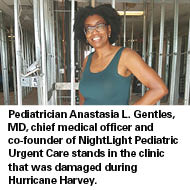
When the staff of a Houston-area children’s urgent care clinic saw security-camera images of brown, murky Hurricane Harvey floodwater submerging their waiting room, they knew it was bad.
 “At first it was just water on the floor,” said pediatrician Anastasia L. Gentles, MD, chief medical officer and co-founder of NightLight Pediatric Urgent Care clinic in Humble. “Then a couple of hours later you couldn’t see the chairs. It was a little lake in there. Our x-ray equipment, our nebulizers, all of our inventory except the few things in the upper cabinets — was destroyed. Our whole crash cart had water in it.…It was awful.”
“At first it was just water on the floor,” said pediatrician Anastasia L. Gentles, MD, chief medical officer and co-founder of NightLight Pediatric Urgent Care clinic in Humble. “Then a couple of hours later you couldn’t see the chairs. It was a little lake in there. Our x-ray equipment, our nebulizers, all of our inventory except the few things in the upper cabinets — was destroyed. Our whole crash cart had water in it.…It was awful.”
After the water receded, photos documented the damage: Unopened packages of child-size bandages stamped “Arm Sling,” tongue depressors, stethoscopes, boxes of stickers — Sponge Bob, Paw Patrol, Mickey Mouse — were crumpled and waterlogged. Stethoscopes sat in water-lined drawers. Cabinets and drawers were warped and splitting.
In the lobby, a beige filmy slime covered a nest of furniture — a colorful child-size plastic table, little chairs, and adult-size waiting room chairs. Mold was quickly growing, so all internal walls would have to be removed.
Clinic staff salvaged what little they could, raced to schedule a demolition crew and contractor to rebuild the facility, and searched for a temporary home in which to care once again for their young patients.
“We feel the loss from a community standpoint. Everybody keeps calling us — people were coming up to the door even the day after the storm, to get their children seen,” said Dr. Gentles. “So we know they’re missing us.” They also want to reopen quickly to help the people employed in the practice — many of whom lost their home or cars in the flood — get back to work.
More information on Hurricane Harvey recovery can be found in TMA's Disaster Preparedness & Response Resource Center or by contacting the TMA Knowledge Center at knowledge[at]texmed[dot]org or by calling (800) 880-7955 or (512) 370-1544.
Physicians who want to help their colleagues rebuild can make a tax-deductible donation to the TMA Disaster Relief Program, which aims to help the countless medical practices across south and coastal bend Texas facing a similar fate return to caring for their patients as quickly as possible.

“People need their doctor, but so many of our physicians suffered total, devastating losses to their medical practices as a result of Hurricane Harvey,” said TMA President Carlos J. Cardenas, MD. “We wanted to jump in and help them rebuild or relocate as quickly as possible, because their patients need them.”
Funds from the Disaster Relief Program will help physicians pay for storm loss expenses their insurance or other sources will not cover. The goal is to raise more than $1 million.
TMA’s philanthropic arm, TMA Foundation, is overseeing fundraising, and The Physicians Benevolent Fund is administering the TMA Disaster Relief Program. TMA says any Texas physician whose practice was damaged by Harvey may apply to The Physicians Benevolent Fund for assistance.

Credit: Photos courtesy of NightLight Pediatric Urgent Care